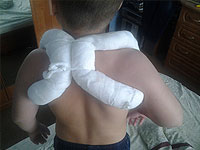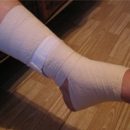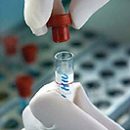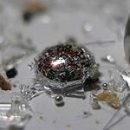How to care for a premature baby? What should be care at home? Answer to this question you will find in the article.
Content
When medical intervention cannot prevent premature birth, the future mother is transferred to the resuscitation department of newborns, where special conditions have been created. The likelihood of the birth of a child for a period of less than 25 weeks is very small. Complications after premature births for the health of the premature child and their effect on its development is directly dependent on the period of pregnancy.
If the child was born shortly before the expected date of birth, he has more chances for survival. In this case, the likelihood of health problems is also insignificant small.
Since premature babies are born until the completion of the full period of pregnancy, the weight of the premature child is much less than the weight of ordinary babies, which appear on the light after 9 months of pregnancy. Premature babies are especially susceptible to various diseases, their branch their organs have not yet managed to finally form. Premature babies require special medical care until the system of organs will not be full and sufficiently developed to function without medical care.
 Although most of the premature children who are born between 32 and 37 weeks of pregnancy, with good care, they quickly catch up with the weight and development of full-fledged children, premature babies, born on a period of less than 26 weeks, are at risk of developing long-term physical defects, for example, mental delays Development, hearing loss and brain paralysis. In the resuscitation department of newborns, premature babies are placed in «incubator». These incubators made of transparent plastic support the temperature of the child constant, limit the loss of fluid and reduce the possibility of entering the infection.
Although most of the premature children who are born between 32 and 37 weeks of pregnancy, with good care, they quickly catch up with the weight and development of full-fledged children, premature babies, born on a period of less than 26 weeks, are at risk of developing long-term physical defects, for example, mental delays Development, hearing loss and brain paralysis. In the resuscitation department of newborns, premature babies are placed in «incubator». These incubators made of transparent plastic support the temperature of the child constant, limit the loss of fluid and reduce the possibility of entering the infection.
Premature children need special nutrition, since their digestive systems are still undeveloped and the weight of the premature baby is small. Powered through a tube or intravenous meals is used until the premature child can suck and swallow. Sometimes the child is fed through the tube with a closed breast milk of mother, which contains proteins that protect the body of the kid from infections and accelerating its growth.
A premature infant can remain in the resuscitation department of newborns for several weeks or months. The first six weeks are considered the most critical for the life of a premature child. The first weeks of the life of a premature baby is absolutely impossible to foresee, so the doctor will allow an extract home only if the following conditions are followed:
- If a premature baby is able to maintain the body temperature in an open cradle at least 24 - 48 hours.
- If the baby is ready for artificial or breastfeeding, and additional feeding through the tube if required.
- If the baby shows signs of stable growth and development.
Typical health problems for premature babies
Stopping breathing in a dream (apnea): This means that the baby may experience a stop period in a dream when the heartbeat slows down, and the skin slightly blue.
Respiratory failure: the premature babies often have a breath due to the underdevelopment of the lungs.
Anemia: In the blood of premature children lacks red calves, so in some cases blood transfusion. In addition, the lifetime of the Red Blood Taurus in such a child is very small.
Risk of infection (the most likely): the premature child is susceptible to increased risk of infections, as any part of his body can be easily infected.
Hyperbilirubinemia: This is a disease in which the baby is frustrating jaundice. It is very important to control this disease, since it can cause brain damage if the level of bilirubin exceeds the permissible level.
How to care for a premature child at home
Premature babies require special care and attention at home. Mothers will have to devote to the child all the time, especially the first weeks. Support for all family members can only benefit the infant. Doctors do not recommend to give the baby in the first year, who was born before the last period in Nursery. Thanks to the love and care of domestic, the baby will grow completely normal and healthy.
Restriction of the number of visitors: premature children are predisposed to diseases, because they have very weak immunity. Their body cannot protect themselves from infections, unlike the body of kids born after 9 months of pregnancy. Therefore, it is better to take care and restrict access to the child. Adults or children suffering from cold or flu should not be near the infant. Child should surround almost sterile purity. In the first three months it is not recommended to make a child from home.
Frequent feeding: On the day of the child you need to feed at least 8 - 10 times, and it should be done very slowly. High risk of necrotic enterocolitis (gastrointestinal disease). In order to avoid dehydration, the interval between feedings should not exceed 4 hours. After feeding, it is necessary to check if the child did not dug. Excessive tightening can prevent the child to gain weight. In this case, you should seek help to a doctor.
Healthy sleep: premature babies sleep more hours a day than ordinary kids. Choose a solid mattress and make sure that the baby is sleeping on the back, and not on the stomach to reduce the risk of sudden death syndrome in a dream.
Preparation for an emergency: Even after the discharge of home, the doctor can recommend for some time to continue to enjoy special equipment, for example, by the respiratory monitor. Mother, as well as other family members, should know how to handle such equipment. You should also learn the basics of first aid, print the recommendations of the doctor and hang them in a prominent place in the children's room.
Vaccinations: vaccinations to premature children are made by such graphics as the usual. This graph is preferably adhere to each vaccination is important. With proper care, the child's health will become stable, and it will quickly catch up its peers.









